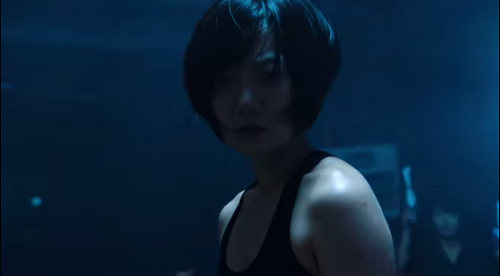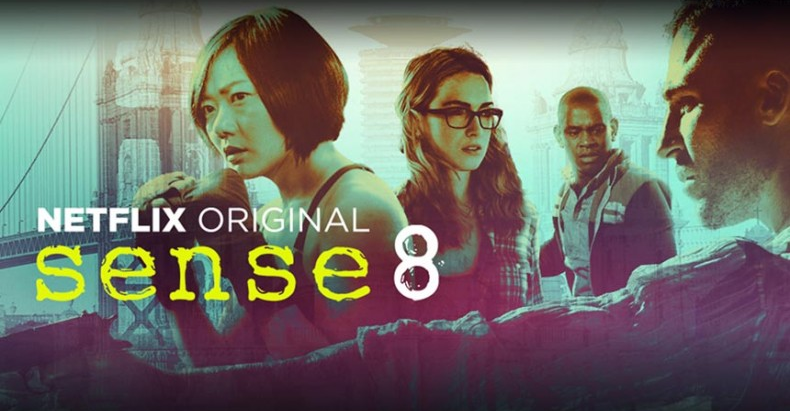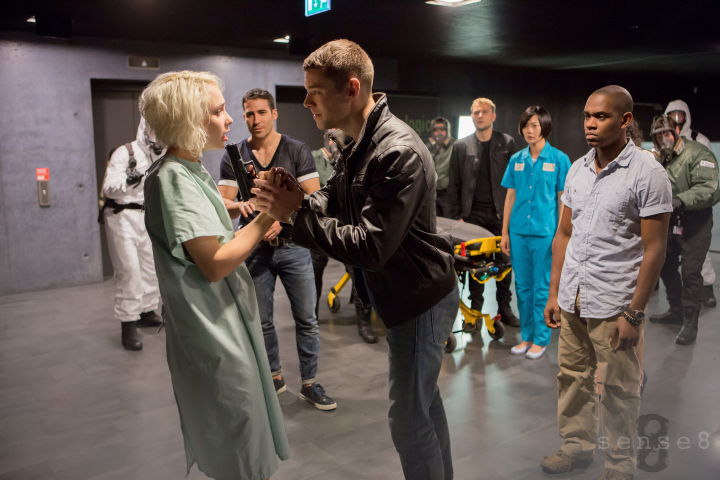Created, produced, and written entirely by the team of filmmaking duo Andy and Lana Wachowski (The Matrix, Cloud Atlas) and TV & comics guru J. Michael Straczynski (Babylon 5, a very divisive run on Amazing Spider-Man), Sense8 is the story of eight individuals in seven different countries who discover that they have a psychic link to one another, and that their abilities make them a target for a global conspiracy. Typical of the Wachowskis, it is a story about unity and individualism, humanism and faith, choice and destiny. Typical of JMS, it is an intricately plotted long-form story that reportedly has already got five years worth of story plotted out, with a finite ending. Typical of both, when it’s good it’s really good, and when it’s bad it’s awful.
At its best moments, Sense8 is lively, gripping, and imaginative. The sci-fi premise of the series is something I can’t recall seeing done before (though it was certainly informed in part by the Wachowskis’ work on Cloud Atlas), and the show’s visual language makes the specific quirks of the world very easy to follow. The unique way in which the lead characters interact (without ever actually being in the same room) gives Sense8 a special flavor that often pays off with some great pathos. As with any ensemble drama, there are some characters you’ll love and some you just won’t care about, but the focus shifts around often enough that, with patience, you’ll always get back to someone you like within a couple of minutes.
The trouble is that, while their special abilities make them interesting on an intellectual level, none of the characters on Sense8 are particularly complex on their own. That’s not to say that they aren’t entertaining, it’s just that—in the space of twelve hours—none of them develop much beyond their original logline descriptions. When the series begins, each of the lead characters is essentially on their own show, and you can encapsulate each show in one sentence:
- Happy-go-lucky van driver Capheus (Aml Ameen) must ally with a brutal crime lord in order to afford his mother’s urgent AIDS medication.
- Sun Bak (Doona Bae) is a businesswoman by day and a kickboxing prizefighter by night whose brother’s embezzlement puts her family company in danger.
- Reformed hacktivist Nomi Marks‘ (Jaime Clayton) happy life with girlfriend Amanita (Freema Agyeman) is put in jeopardy by an evil corporation that wants to control her supernatural abilities.
- Kala Dandekar (Tina Desai) is conflicted over her engagement to an incredibly great guy who she doesn’t love (Purab Kohli), especially after she learns that her future father-in-law is lobbying to essentially ban Hinduism in India.
- DJ Riley Blue (Tuppence Middleton) is chased out of London by her criminal companions, but a dark past and an alleged hex make her afraid to return to her native Iceland.
- Action movie star Lito Rodriquez (Miguel Ángel Silvestre) must live a double-life to keep his homosexuality a secret from the public, and ends up taking in the wacky Daniela (Erendira Ibarra) as his live-in beard.
- Wolfgang Bogdanow (Max Riemelt) is a great safe-cracker—maybe too good, as his latest heist puts him at odds with other members of his criminal family in Berlin.
- Will Gorski (Brian J. Smith) is a Chicago cop with a heart of gold who is befriended by alleged terrorist Jonas Maliki (Naveen Andrews) who teaches him about his true, superpowered nature.
It’s that superpower that connects these eight stories; each of them is a Sensate, someone who is telepathically linked to seven others who were born at the exact same moment. They can psychically visit each other, share skills and experiences, and trade control over each others bodies at will. After their powers are activated by the mysterious Angelica (Daryl Hannah), they slowly begin to learn about each other, help each other through their struggles, and unravel a conspiracy led by one of their own kind (Terrence Mann) to capture and control them. The Sensates are described by mentor Jonas Maliki as being one person, divided into eight independent bodies, but for all intents and purposes these are individuals who share a unique bond, the extent of which is promised to be explored further in future seasons.
On a practical level, the connection between the Sensates is a device to help characters conquer obstacles they can’t surmount on their own. Members of their cluster (that’s what a group of Sensates is called) frequently call upon Sun to take over during hand-to-hand combat, as she’s an unbeatable fighting machine. When one of them needs to tell a convincing lie, actor Lito will take over. Need to pick a lock or blow something up? Wolfgang is your man. Whenever a one of the Sensates hands control of their body to another, the actors swap back and forth on screen, allowing for some very striking visuals, particularly during fight scenes.

Kickboxing badass Sun (Doona Bae) makes quick work of evildoers across the globe without leaving Korea.
The Sensates also reflexively (and later, by choice) visit each other in moments of emotional turmoil to lend emotional support or advice. The Sensates have an innate bond, which sometimes manifests like siblings, but also easily turns romantic. Two pairs of Sensates become romantically involved over distance, despite warnings from Jonas that love within a cluster is “the ultimate form of narcissism.”
The thing is, the Sensates can hardly be blamed for falling in love with each other, not only because of their innate emotional bond, but because (with one exception) they’re all incredibly good people, to the extent that it’s actually frustrating to watch. Sense8‘s biggest problem is that the protagonists are so good-hearted that they become boring. Will, Nomi, Kala, Sun, and especially Capheus seem to lack any character flaws whatsoever. Lito and Riley are held back only by their fear; for Lito, it’s fear of being outed as gay and losing his career, fear that blinds him to his perfect boyfriend Hernardo’s suffering; for Riley, it’s the fear that she’s cursed to watch everyone she loves die, and given her experience it’s actually a pretty justified fear.
The most prominent gray character in this otherwise black-and-white story is Wolfgang, a career criminal from a family of career criminals whose predilection and proficiency for violence make him A) a bad person and B) very fun to watch. Like all the other Sensates in his cluster, he’s charming and likable, if not particularly memorable. Wolfgang’s dark side is balanced by his love for surrogate brother Felix, and his flip attitude toward just about everything.That’s not to say that Sense8 is devoid of villains and monsters.
The season’s Big Bad, Whispers (Terrence Mann), is a Sensate whose M.O. is to lobotomize and control other Sensates. Whispers is in a different cluster than our main characters, but Sensates can visit (though not share with) other Sensates with whom they make direct eye contact, and that connection lasts for as long as they both live. That means that Whispers can follow you, hear your thoughts, sense your fear, find you anywhere, all because you failed to look away in time. Once he’s connected with you, he can use you to get to the rest of your cluster. He’s like a thought-transmitted disease, utterly terrifying in both concept and execution. The level of anxiety Whispers generates just by being in a scene is truly remarkable.
There are some secondary villains as well, most memorably Nomi’s manipulative transphobic mother Janet (Sandra Fish) who in two scant appearances manages to be the most loathsome character I’ve seen so far this year. Every time she calls Nomi “Michael” it feels like she’s twisting a knife. There are a handful of other abusive or neglectful parents in the mix as well, as well as four continents’ worth of killers and crime lords for our heroes to contend with, but no one as compelling as Whispers or Janet.
None of the Sensates’ individual stories would likely be interesting enough to support its own television series, but it’s the effort of weaving those stories together that makes Sense8 worth watching. Over time, a clear central narrative develops which sees all eight of our heroes contributing to help one of their cluster escape from Whisper’s clutches, but by the end of Season One, only two of them have met in the flesh. This is a very wise decision on the part of the show’s creators, as once you have all eight Sensates together in one place their ability to communicate and share skills becomes useless, both practically and as a story device.
There’s a lot more I could say about Sense8, and I think that’s why I like it. Though the characters can be shallow and the dialogue is sometimes cringe-inducing, there is a lot going on both practically and conceptually on this show. It’s incredibly ambitious, and while it doesn’t land all of its punches, it lands a lot of them. This is a series I could imagine discussing with someone for hours and have a great time doing it. Sense8 is not the landmark, game-changing TV show it set out to be—nor is it even the strongest Netflix debut of 2015, but it’s a truly original sci-fi ensemble drama with tremendous potential for growth and I’m excited to see more.
The first season of Sense8 is now streaming on Netflix.




